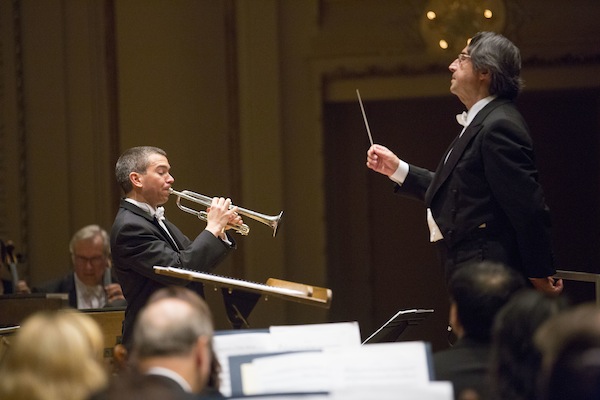Muti, CSO hit their stride with Russian-Polish program

Even for the esteemed partnership of Riccardo Muti and the Chicago Symphony Orchestra, it seemed to take a couple weeks to get their groove back. Thursday night’s mostly Russian program may not have offered the most adventurous lineup of repertory, yet it received the most consistent advocacy of the three fall subscription concerts of this young season.
The main beneficiaries will be European audiences when Muti and the orchestra take to the road in two weeks. (Chicago audiences will not see the CSO music director again until January.) The orchestra will make their first visit to Warsaw on this tour, and this final program of Muti’s fall residency offered a work geared to make a hit with Polish audiences.
The evening began with music of Andrzej Panufnik to mark his centennial year. The Polish composer (1914-1991) led a cinematic life that at times defied belief, including having all of his manuscript scores thrown in the garbage and incinerated during the war, some of which works he later painfully reconstructed.
Panufnik wrote a great deal of edgy and powerful music. The Concerto in modo antico is not among them. Written in 1950 (and revised five years later), the concerto is one of the handful of works Panufnik composed after the war, a politically cautious time when it was safer to draw upon older musical forms.
A 15-minute suite for solo trumpet, strings, harp and timpani, the concerto is cast in seven brief contrasting sections. Notwithstanding the program note that states “the voice of Poland itself” is manifest in the music, there’s little national color apparent in a work centered on lightweight neo-Baroque frippery.
Still, any opportunity to hear Christopher Martin as a soloist is a welcome one. The CSO’s principal trumpet brought just the right approach to this amiable pastiche, playing with slender, gleaming tone and nimble elegance, and finding a valedictory vein in the second section. Muti and Martin’s colleagues provided spirited and athletic support.
Stravinsky’s Firebird ballet isn’t exactly concert-hall esoterica, but the familiar 1919 suite emerged notably fresh and vital. Muti’s fidelity to the score and textural clarity brought out the imagination and luminosity of Stravinsky’s scoring, with a deft underlining of the pre-echoes of Rite of Spring. Kaschei’s dance was truly infernal with daunting sonic punch and the final section glowing yet avoiding bombast. Mostly this Firebird served as a mini-concerto for orchestra with all the first chairs at their finest, particular hornist Daniel Gingrich, clarinetist Stephen Williamson, and bassoonist William Buchman, whose gentle, silken lead-in to the Berceuse was extraordinary.
Tchaikovsky’s Symphony No. 3 belatedly received its dubious “Polish” subtitle by virtue of the tempo marking for the final movement, “Tempo di polacca” (in the tempo of a polonaise). In fact, there’s little of Polish flavor in that finale or anywhere else in the rest of the work. The bustling, regal main motif of the first movement, in fact, sounds even more inherently Russian than most of Tchaikovsky’s themes.
The Third is Tchaikovsky’s only symphony cast in five movements yet, despite its lilting melodies and surface attractions, is the weakest of the composer’s seven works in the genre (counting Manfred). There is a marked advance in handling of the orchestra from the Second, yet Tchaikovsky’s Third is undeniably slight without much expressive power or depth. The three middle movements, in particular, inhabit a style that verges on the salon, closer to Tchaikovsky’s orchestral suites and ballets. (In fact, he would commence work on Swan Lake shortly after completing the Third Symphony.) One can’t help thinking that a genuine “Polish symphony” by Penderecki, Panufnik or Lutoslawski would have offered a meatier program choice for Warsaw audiences–and Chicago audiences, for that matter.
Yet Muti clearly believes in this work and he and the orchestra gave the second installment in this season’s Tchaikovsky symphony series a luxuriant, richly spun performance. The woodwinds shone once again in the middle sections, particularly Buchman’s poetic bassoon and the remarkable, aristocratic flute playing of Mathieu Dufour—the latter lent a bittersweet quality in this penultimate Chicago program for the CSO’s principal flute before he departs for the Berlin Philharmonic. Muti’s quick tempo for the finale made for the fastest polonaise in history, yet rounded off the performance in exhilarating fashion.
The program will be repeated 1:30 p.m. Friday and 8:30 p.m. Saturday. cso.org; 312-294-3000.
Posted in Uncategorized


